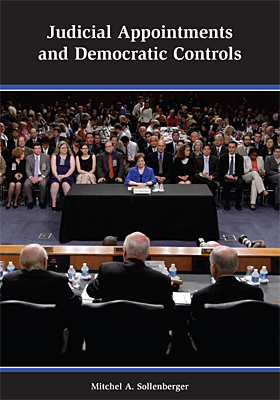Freshly Pressed highlights books written or edited by members of the UM-Dearborn community. Faculty, staff, alumni and students are welcome to submit their recently published titles to this column by e-mailing Reporter editor Jennifer Thelen at [email protected] with a summary of the book, a high-resolution JPEG of the book's cover and a URL where readers can purchase the title, if applicable.
 This month, Carolina Academic Press is set to publish Judicial Appointments and Democratic Controls by Mitchel Sollenberger, assistant professor of political science.
This month, Carolina Academic Press is set to publish Judicial Appointments and Democratic Controls by Mitchel Sollenberger, assistant professor of political science.
"What I set out to do is to highlight the struggles between the president and Congress in context of the judicial appointment process," Sollenberger said. "My work is both a normative and polemic take on that and offers a step-by-step account of how the judicial appointment process operates along with providing quite a bit of historical coverage of the topic. In the end I come down against a theory that the president should control the appointment process without the congressional checks that the Constitution established."
From the Carolina Academic Press website:
The Constitution provides that the president "shall nominate, and by and with the advice and consent of the Senate, shall appoint" federal judges, but that language is not precise and leaves much to the imagination. At various points in time Congress and the president have battled over how to exercise joined responsibility in making judicial appointments. Some argue that the founding fathers would have found the increased tension between the branches in recent decades regrettable as it has led to political posturing and too great a focus on ideological concerns.
Sollenberger disagrees and believes that the framers intentions are still well maintained in the modern judicial appointment process. He contends that Congress and the president have been guided by republican values and structural protections intended by the Constitution. These elements constitute the democratic controls that have helped the political branches give meaning to the Constitution by shaping the judicial appointment process. Changes over the years that have given elected officials greater ability to review judicial candidates' records and qualifications to office, Sollenberger argues, is well within the framework of the Constitution and meets the intent of the framers.
In presenting his thesis, Sollenberger delves into all stages of the judicial appointment process analyzing Congress's power to create and abolish offices, place qualifications on office holding, give advice and recommend candidates, and generally provide detailed scrutiny and review of all judicial nominations. Each chapter presents one part of the judicial appointment process analyzing its development overtime and showing how democratic controls have strengthened the overall system.



